South Carolina’s Republican governor, Henry McMaster, signed a bill that prohibits health professionals from providing gender-transition surgeries, puberty blocking drugs, and hormone treatments to individuals under the age of 18. The new law, which took effect immediately, also requires schools to inform parents when their children express a desire to use a different name or pronouns that do not align with their sex assigned at birth. South Carolina now joins a growing number of states that have implemented restrictions or outright bans on gender-affirming care for minors.
Efforts to pass legislation restricting gender-transition treatments for minors in South Carolina date back to 2021 and 2022, with previous attempts falling short in the State House of Representatives. While a broader bill banning transition care for minors was delayed in 2022, a provision in the state budget prohibited a pediatric clinic from using state funds for transition care for individuals under 16. The clinic later decided to halt hormonal treatments for individuals under 18. House Republicans prioritized the issue of gender-transition care in this election year, leading to the passing of House Bill 4624, which expands the ban on care for minors to all providers statewide and prevents adults under 26 from using Medicaid to cover the costs for such care.
Governor McMaster defended the new legislation, stating that it aims to protect children from irreversible gender transition procedures. He announced plans to meet with supporters of the bill at a ceremonial signing. However, Dr. Elizabeth Mack, president of the South Carolina chapter of the American Academy of Pediatrics, criticized the measure during a House committee hearing in January. She argued that gender-affirming care is evidence-based and essential for suicide prevention. Dr. Mack also noted that gender-transition surgery is not currently being performed in South Carolina and that transition care is carefully considered by doctors, parents, and children.
The passage of the bill in South Carolina reflects a broader trend among conservative-led states to restrict gender-transition treatments for minors. While supporters of such legislation argue that it helps to protect young individuals from making irreversible decisions, critics contend that these restrictions undermine the rights of transgender youth to access necessary medical care. The debate surrounding gender-affirming care for minors is likely to continue, with advocates and opponents grappling over the balance between parental rights, medical evidence, and the well-being of transgender individuals.
As South Carolina implements these new restrictions on gender-affirming care, the state is at the center of a growing nationwide conversation about transgender rights and access to healthcare. The bill signed by Governor McMaster represents the latest effort by conservative lawmakers to limit gender-transition treatments for minors, raising questions about the intersection of politics, healthcare, and LGBTQ rights. The impact of these restrictions on transgender youth in South Carolina remains to be seen, but the debate over gender-affirming care is likely to persist as states grapple with differing perspectives on this issue.


